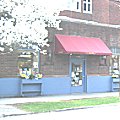- By Dan Veaner
- Around Town
 Print
Print  Last week two Ithaca bookstores announced they would be closing. Borders immediately put everything on sale, the Ithaca store being one of 200 that is closing as part of the corporation's Chapter 11 filing. Buffalo Street Books also began selling off its inventory, selling abut $30,000 worth in the first week. When the sales are over Borders will be gone. But Buffalo Street Books may yet be resurrected with an unusual and innovative business model. Employee Bob Proehl put out a call for investors to raise $200,000 to buy the store and keep it alive in Ithaca. Incredibly he received $150,000 in pledges within the first week. If he succeeds the store will be more of a cooperative like Greenstar Market than a traditional business.
Last week two Ithaca bookstores announced they would be closing. Borders immediately put everything on sale, the Ithaca store being one of 200 that is closing as part of the corporation's Chapter 11 filing. Buffalo Street Books also began selling off its inventory, selling abut $30,000 worth in the first week. When the sales are over Borders will be gone. But Buffalo Street Books may yet be resurrected with an unusual and innovative business model. Employee Bob Proehl put out a call for investors to raise $200,000 to buy the store and keep it alive in Ithaca. Incredibly he received $150,000 in pledges within the first week. If he succeeds the store will be more of a cooperative like Greenstar Market than a traditional business."There are a number of ways you can think about this," Proehl says. "There is already a perceived concrete monetary value that I think a lot of people understand when they buy books at a local independent bookstore. I think it operates as a sort of literary arts center. It services the literary community whether that is something as simple as offering local authors a place to sell their books, offering a place for readings, or just offering a place to encourage a love of literature."
The store was originally owned by Jack Goldman, who still owns the original Bookery, which specializes in used books. About five years ago he sold it to Gary Weisbrot, who changed the name to Buffalo Street Books two years ago. But facing many of the the same challenges that Borders is struggling with, Weisbrot decided he had to close his doors.
Proehl wasn't about to take that lying down. He wrote a four page letter to possible investors, touting the value of a locally owned community bookstore, and redefining what that means. He says that many people have come into the store to say that they couldn't believe a local Ithaca bookstore could be closing.
"What I put out was, 'Do you want it? Come get it. It's here.' If the community wants a bookstore then the community should have a bookstore, but it shouldn't be on one person's shoulders," Proehl says. "If we're all in it, then let's buck up and put it on the line that's more than rhetorical."
He adds that owning a bookstore in today's business environment is overwhelming for any one person. He says he thinks he can turn the store around so it is profitable, but not necessarily by just selling books. The 'literary arts center' idea resembles traditional performing arts center approaches more than an actual business model. That will mean constant fundraising to support bookselling and other related activities.
"There are other businesses in Ithaca that we may not necessarily think of as businesses, but in one of their aspects they are," Proehl says. "Think of the Hangar Theatre. If they have to survive purely on ticket sales one of two things happens: either they are trying to sell $300 tickets or they quickly go out of business. But the community has decided it is of a value to have that institution there and they support it in other ways. I think if you eliminate the businesses in Ithaca that couldn't make a profit on a strictly market model, the city begins to look very bleak."
 Bob Proehl
Bob ProehlOriginally from Buffalo, Proehl moved to Ithaca in 2001 after finishing a Masters in American literature at Boston University. He worked at Gimme! Coffee, then ran No Radio Productions, a music promotion company, that morphed to a DJ collective and then a record store, then as a bartender before joining Buffalo Street Books. His role at the store has been focusing on outreach, marketing, maintaining the Web site, and similar tasks.
Proehl also speaks of profitability in broad terms, saying that while the store has to be monetarily profitable in order to sustain itself that investors might reap other kinds of profit, be they the emotional satisfaction of being part of a local bookstore, or simply having a way to make the Ithaca experience richer and, well, less bleak.
 In less than a week Ithacans pledged over $150,00 toward the goal of $200,000 needed to keep Buffalo Street Books alive.At first Proehl wished for a benefactor with deep pockets, but it quickly became clear that was not going to happen. He is gratified by the range of pledges that people have been making. He says three donors have pledged sizable amounts, but most of the money comes from people buying between one and four $250 shares. The overwhelming initial success of this first stage of his idea has forced him to come up with a concrete plan very quickly, and that is what he is working on this week. This week he has been consulting with people who currently run local cooperatives and says he hopes to have a more concrete plan for how the bookstore will work within a week or so.
In less than a week Ithacans pledged over $150,00 toward the goal of $200,000 needed to keep Buffalo Street Books alive.At first Proehl wished for a benefactor with deep pockets, but it quickly became clear that was not going to happen. He is gratified by the range of pledges that people have been making. He says three donors have pledged sizable amounts, but most of the money comes from people buying between one and four $250 shares. The overwhelming initial success of this first stage of his idea has forced him to come up with a concrete plan very quickly, and that is what he is working on this week. This week he has been consulting with people who currently run local cooperatives and says he hopes to have a more concrete plan for how the bookstore will work within a week or so. "There is no cooperative model that exactly fits what we're doing," he says. "That doesn't mean that we're cobbling something together out of parts. We're looking at what's out there and choosing the best path both for the business to be sustainable, and for it to be profitable for our member owners, whether that be financially, emotionally, intellectually -- just to make it work as well as it can for everybody."
Proehl says that Weisbrot will continue to be part of the store, adding that he thinks Weisbrot would be the ideal candidate for a cooperative board of directors to hire as general manager. He also says that he hopes fundraising will help subsidize sales to local libraries and schools in a time when those institutions are struggling with slashed budgets.
Part of the challenge will be dealing with the explosion of media including growth of ebooks, which can be downloaded at a fraction of the cost of a hardcover book. Proehl says he would like to see the store move into ebook sales at some level.
"Right now ebooks take up about 5% of the market and 95% of the conversation about the market," he says. "From a business standpoint now they are still dismissible. The tipping point is coming very quickly, within, generously, five years. Some of the platforms lock out small businesses. But the American Booksellers Association was in on the Google ebooks project from the ground floor. I think as the Amazon - Apple war is fought Google books will be profitable for independent bookstores. I think they are things that we have to pursue."
He notes that if the store can't keep up with the times it will be the equivalent of a bookstore museum, something he is not interested in being part of. So while the first stage is to interest enough investors to save the store in its current traditional form, the challenge will be to redefine what a local independent bookstore is, and he is banking that Ithacans will agree that is worthwhile.
"We're selling the bookstore to the community," Proehl says. "I believe that Ithaca is a community that deserves a great bookstore. I believe that there is a great bookstore in Ithaca right now. What will happen in a very concrete way is that Ithaca will have the bookstore that it deserves."
v7i8



